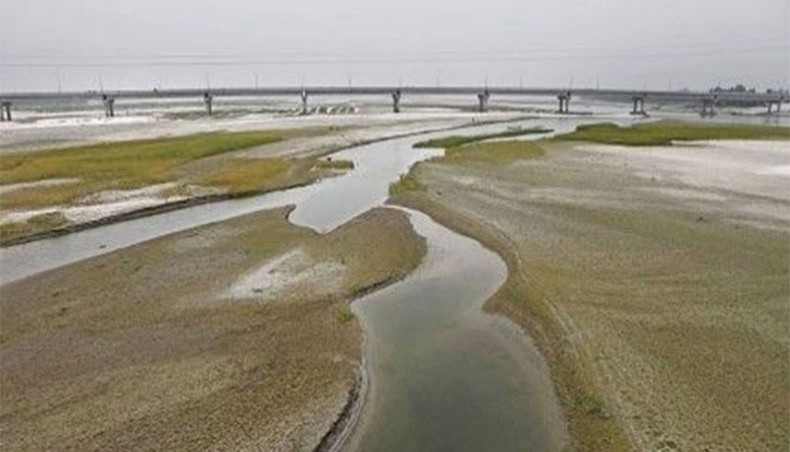India stalls water sharing talks for eight years
India has kept talks on sharing of water of common rivers with Bangladesh stalled for over eight years holding back the signing of interim agreements on Teesta and Feni rivers and making negotiations on five more rivers uncertain.
India has been declining since 2010 to hold a water resources ministers-level meeting of the Joint Rivers Commission sought by Bangladesh, diplomatic sources said. The ministers are co-chairs of the commission.
India has also been holding chairmanship of the commission for over eight consecutive years in violation of Article 3 of the Statute of the Indo-Bangladesh Joint Rivers Commission, which says, ‘The chairmanship of the commission shall be held annually in turn by Bangladesh and India.’
Bangladesh has sent at least 10 letters to Indian authorities since second half of 2010 through diplomatic and JRC channels for a water ministers-level meeting but got no positive response from the next door neighbour, diplomats said. Chapter V of the statute says, ‘The ordinary sessions of the Commission shall be held as often as necessary, generally four times a year. In addition special meetings may be convened any time at the request of either government.’
The latest JRC meeting was held in New Delhi in March 2010.
Successive Indian prime ministers Narendra Modi and Manmohan Singh continued to promise to conclude interim agreements on sharing waters of seven transboundary rivers, Teesta River in particular, in spite
of requests of Bangladesh prime minister Sheikh Hasina on almost every occasions they met.
Hasina is expected to reiterate the request to Modi in a meeting at Shantiniketan in West Bengal of India on Friday for concluding the Teesta agreement as agreed upon by both the governments in January 2011. West Bengal chief minister Mamata Banerjee is also scheduled to attend a function Visva Bharati University with the two prime ministers.
In an unflinching delivery in presence of Hasina after their latest official bilateral talks in New Delhi in April 2017, Modi said that his government was working with ‘all stakeholders in India’ for an early conclusion of the Teesta agreement and the two governments would sign the deal by their [present] tenures.
The two prime ministers also ‘directed concerned officials to conclude meanwhile discussions on various aspects relating to sharing of waters of the Feni, Manu, Muhuri, Khowai, Gumti, Dharla and Dudhkumar rivers,’ according to the joint statement published on April 8, 2017 on official visit of Bangladesh prime minister to India.
Officials are, however, sceptical about the possibility of signing an agreement on sharing Teesta waters during Hasina’s present tenure as the general elections in Bangladesh need to be held by January 28, 2019.
After the finalisation of the draft of the Teesta deal by the two sides, India backtracked on the signing several hours before the arrival of Manmohan Singh in Dhaka on September 6, 2011 on the plea that West Bengal chief minister Mamata Banerjee objected to the agreement.
According to the framework of an interim agreement finalised in 2010, the two sides agreed to share Teesta water on fair and equitable basis on a 50-50 water sharing ratio after keeping 20 per cent of Teesta waters as environmental flow during lean season.
India was, however, of a mind to sign an interim agreement on sharing waters of Feni River before signing the Teesta deal. Bangladesh was of the opinion that the two interim instruments should be signed together.
The two JRC chapters exchanged data and information on flows for preparing a framework on signing agreement[s] on sharing of flows of the Manu, Muhuri, Khowai, Gumti, Dharla and Dudhkumar rivers.
Asked about holding a water resources ministers-level meeting, Joint Rivers Commission’s Bangladesh chapter member M Mofazzal Hossain said that they were in touch with the Indian side for holding the meeting.
He said that JRC technical bodies were working on a regular basis in accordance with the mandate described in the statute to assess river flows, data and information sharing and flood warnings.
The last minister-level meeting was held in March 2010 in India. It was the 37th meeting of the commission founded in 1972.
India and Bangladesh share at least 54 transboundary rivers of which agreement has been reached only on sharing of water of the Ganga River, based on a sharing formula of the flows measured at Farakka during the lean season each year, from January 1 to May 31. The 30-year treaty signed in 1996 is renewable by mutual consent.
Bangladesh also shares Sangu, Matamuhuri and Naf rivers with another neighbour Myamar.
Centre for Environmental and Geographic Information Services, an independent research organisation established by the government, identified 16 more rivers as transboundary rivers in addition to 57 common rivers with India and Myanmar.
News Courtesy: www.newagebd.net











